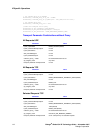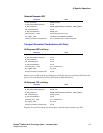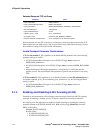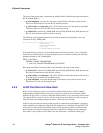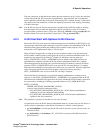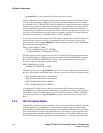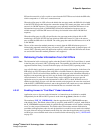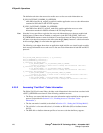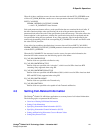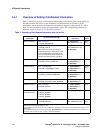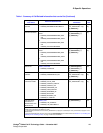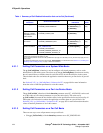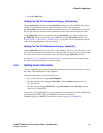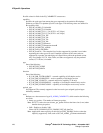Dialogic
®
Global Call IP Technology Guide — November 2007 119
Dialogic Corporation
IP-Specific Operations
SIP uses the term delayed offer to refer to cases where the INVITE does not include the SDP offer,
which corresponds to a “slow start” connection mode.
When the calling party in a SIP call uses the default fast start setup mode, the SDP offer is included
in the INVITE message that initiates the connection attempt. The remote party then sends an SDP
answer in its 200 OK response. (The remote party may optionally include the SDP answer in an
informational response such as 180 RINGING, but because informational responses are not
reliable messages in SIP the SDP answer will always be included in the reliable 200 OK final
response.)
When the calling party in a SIP call specifies the slow start setup mode (delayed offer in SIP
terminology), the initial INVITE does not include an SDP offer. Instead, it is left to the remote
party to make the SDP offer in its 200 OK. The calling party then sends the SDP answer in its ACK
to the 200 OK.
Note: The use of the connection method parameter to control when the SDP offer/answer process is
initiated only supported in the first party call control (1PCC) operating mode. In the third party call
control (3PCC) operating mode, the application explicitly controls when the SDP offer and answer
are sent and the connection method parameter is not supported.
4.2.5 Retrieving Coder Information from Call Offers
Note: The information in this section only applies when the Global Call IP Call Control library is started
in the first party call control (1PCC) operating mode. The capability described in this section is not
supported when the library is started in the third party call control (3PCC) operating mode.
Any call offer that is received can potentially contain coder proposal information, in the form of an
SDP offer in an INVITE request when using SIP or a fastStart element in a Setup message when
using H.323. The IP call control library handles any such proposed coder information internally to
begin the coder negotiation process, but it may be useful to the application to access the offered
coder information, as well. The call control library can be configured at start-up to provide
application access to proposed coder information for SIP or H.323 or both. When this access is
enabled and the library accepts a call offer that contains coder proposals, the extra data associated
with the GCEV_OFFERED event that is sent to the application will contain one or more additional
parameter elements to convey the coder information that was contained in the offer.
4.2.5.1 Enabling Access to “Fast Start” Coder Information
Application access to fast start coder information is a feature that can be disabled or enabled
independently for the SIP and H.323 protocols at the time the gc_Start( ) function is called.
The mandatory INIT_IP_VIRTBOARD( ) function populates the IP_VIRTBOARD structure
with default values. The default values of the sip_msginfo_mask and h323_msginfo_mask fields in
the IP_VIRTBOARD structure disable all optional message information access features, including
access to coder proposal information. The default values of these data structure fields must be
overridden with appropriate values for each ipt board device on which access needs to be enabled.
For each of the two message information mask fields, the value that the application sets is typically
an OR of two or more defined mask values as described in the reference page for IP_VIRTBOARD
on page 553.




